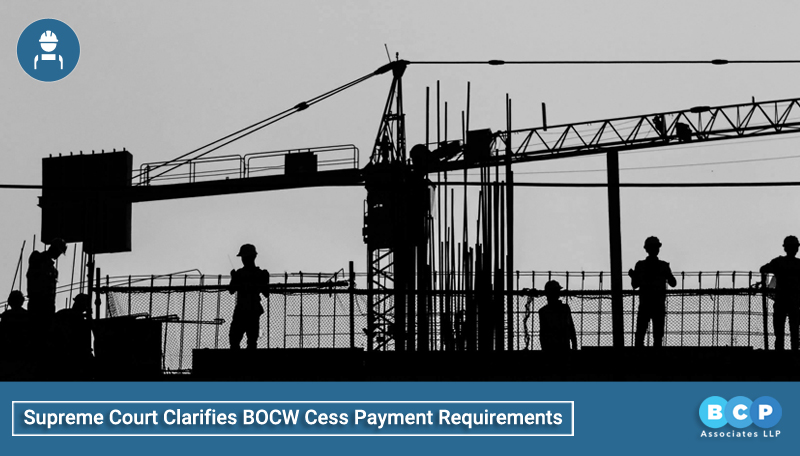
The Supreme Court of India, on the 12th of May held that The Building and Other Constructions Workers (BOCW) Cess is not payable in respect of supply of goods. In Uttar Pradesh Power Transmission Corporation Ltd. and Anr. Vs. CG Power and Industrial Solutions Limited and Anr.[1] held that a contract that was for the supply of goods and provision of services that were not construction services as defined under the Act does not attract cess. It further reiterated that a party to a contract who is the supplier of goods, of whatever nature they may be, is not a Contractor under the Act.
Judgement Impact To Establishments
This judgment brings clarity and relief to many companies, especially those who propose to undertake interior works. Many establishments have been computing and paying cess on material supply contracts as there was a lack of clarity in the legal position, especially when these contracts were tied into larger agreements that included labour as well.
Establishments will also have to relook their contracting procedure. As far as possible, they will need to enter into distinct contracts for the supply of goods and labour. Combined contracts will still raise questions as to the actual bifurcation of cost towards materials. In addition, the assessment made by the authorities may be difficult to challenge.
Case Facts And Judgement
In the case at hand, the Supreme Court was dealing with a case where four contracts had been entered into between Uttar Pradesh Power Transmission Corporation(UPPTCL) and CG power. The project was a turnkey project to set up a power station. It involved all facets of activity, ranging from design to maintenance. While timelines had been set for the project as a whole, only one of the contracts dealt with construction and civil works. Three contracts dealt with supply of goods, design, testing, commissioning and maintenance.
The Auditors of UPPTCL had come to the conclusion that the company had failed to levy and deduct cess under the BOCW Act from the supplier, under Contract 1, which was for the supply of equipment and material and design. UPPTC had already made full payment to CG and therefore sought to partially encash a bank guarantee provided by CG power and pay the cess.
CG power approached the Lucknow bench of the Allahabad High Court challenging this attempt to encash the bank guarantee. The High Court held in favour of CG power and found that the method adopted by UPPTCL to recover cess is incorrect as an assessment by the authorities and a notice of default must precede the attempt by UPPTCL to encash the guarantee. It did not however, answer the larger questions of law as to applicability of the Act to CG power itself.
The Supreme Court, though detailed and reasoned interpretations of the provisions of the BOCW Act and the BOCW Cess Act, held that the Act unequivocally excludes mere supply of goods from its ambit even though it may be part of a larger engagement that involves construction. In other words, Cess is only payable to those parts of an engagement that involve building and construction work as defined under the Act.
– Aditya Kamath, Advocate & Partner
[1] SPECIAL LEAVE PETITION (C) NO. 8630 OF 2020, decided on 12th May, 2021